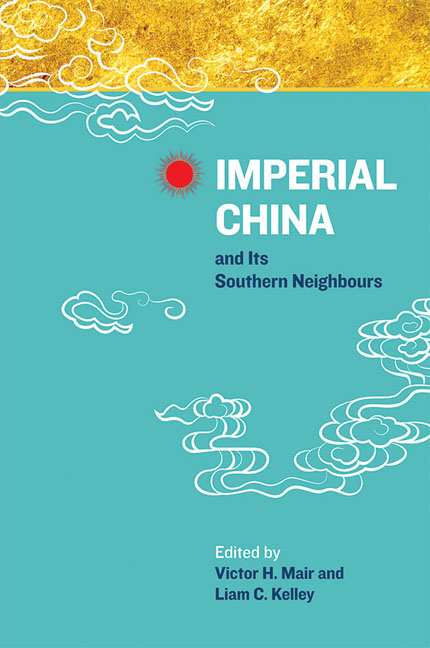Book contents
- Frontmatter
- Contents
- Preface
- The Contributors
- 1 Introduction: Imperial China Looking South
- 2 Layers of Meaning: Hairstyle and Yue Identity in Ancient Chinese Texts
- 3 Sinicization and Barbarization: Ancient State Formation at the Southern Edge of Sinitic Civilization
- 4 Clothes Make the Man: Body Culture and Ethnic Boundaries on the Lingnan Frontier in the Southern Song
- 5 What Makes a Chinese God? or, What Makes a God Chinese?
- 6 Dragon Boats and Serpent Prows: Naval Warfare and the Political Culture of China's Southern Borderlands
- 7 Inventing Traditions in Fifteenth-century Vietnam
- 8 Epidemics, Trade, and Local Worship in Vietnam, Leizhou Peninsula, and Hainan Island
- 9 Southeast Asian Primary Products and their Impact on Chinese Material Culture in the Tenth to Seventeenth Centuries
- 10 New Evidence on the History of Sino'arabic Relations: A Study of Yang Liangyao's Embassy to the Abbasid Caliphate
- 11 The Peacock's Gallbladder: An Example of Tibetan Influence in Late Imperial China
- 12 Transformation of the Yunnanese Community Along the Sino–burma Border During the Nineteenth and Early Twentieth Centuries
- 13 How the North Tried to Pacify the South Through Ritual Practices: On the Origins of the Guan Suo Opera in the Nineteenth Century
- 14 Realms Within Realms of Radiance, or, can Heaven Have Two Sons? Imperial China as Primus Inter Pares among Sino–pacific Mandala Polities
- Index
- Nalanda-Sriwijaya Series
14 - Realms Within Realms of Radiance, or, can Heaven Have Two Sons? Imperial China as Primus Inter Pares among Sino–pacific Mandala Polities
Published online by Cambridge University Press: 06 January 2018
- Frontmatter
- Contents
- Preface
- The Contributors
- 1 Introduction: Imperial China Looking South
- 2 Layers of Meaning: Hairstyle and Yue Identity in Ancient Chinese Texts
- 3 Sinicization and Barbarization: Ancient State Formation at the Southern Edge of Sinitic Civilization
- 4 Clothes Make the Man: Body Culture and Ethnic Boundaries on the Lingnan Frontier in the Southern Song
- 5 What Makes a Chinese God? or, What Makes a God Chinese?
- 6 Dragon Boats and Serpent Prows: Naval Warfare and the Political Culture of China's Southern Borderlands
- 7 Inventing Traditions in Fifteenth-century Vietnam
- 8 Epidemics, Trade, and Local Worship in Vietnam, Leizhou Peninsula, and Hainan Island
- 9 Southeast Asian Primary Products and their Impact on Chinese Material Culture in the Tenth to Seventeenth Centuries
- 10 New Evidence on the History of Sino'arabic Relations: A Study of Yang Liangyao's Embassy to the Abbasid Caliphate
- 11 The Peacock's Gallbladder: An Example of Tibetan Influence in Late Imperial China
- 12 Transformation of the Yunnanese Community Along the Sino–burma Border During the Nineteenth and Early Twentieth Centuries
- 13 How the North Tried to Pacify the South Through Ritual Practices: On the Origins of the Guan Suo Opera in the Nineteenth Century
- 14 Realms Within Realms of Radiance, or, can Heaven Have Two Sons? Imperial China as Primus Inter Pares among Sino–pacific Mandala Polities
- Index
- Nalanda-Sriwijaya Series
Summary
The present King of Cochin China is the true heir and direct lineal descendant of the ancient royal house of Siam, which was extirpated by the Burmans around the year 1750; and as the present Siamese government is weak and distracted, it has for some years been considered a very probable occurrence, that he will soon find or take an opportunity of asserting his claims to the throne of Siam. Though this Prince has derived great assistance from the French in his dominions, on many occasions, he is obviously jealous of all European interference and can only be considered under the influence of the maxims of Chinese policy…. It is not… probable that any thing more than a very limited and hampered trade would ever be permitted with Cochin China; and this will be the more apparent if we consider the humiliating and slavish manner in which all traffic still is, and has been, carried out with both Cochin China and Siam. … It is obvious that trade of this type is by no means accommodated to the habits of Englishmen.
— Stamford Raffles, letter to Lord Minto, 1811There are three possible methods of dealing with the threat posed by proximate concentrations of Power — destruction and dispersal, absorption, or a combination of the two … Destruction … is the least desirable. More satisfactory is the method of absorption.… In theory, absorption is seen as the voluntary submission of neighboring kingdoms to the supreme Power of the ruler. One finds, therefore, in the classic description of the great kings of the past that raja séwu negara nungkul (sujud) — the kings of a thousand kingdoms offer submission to them. Significantly, the glorification of the ruler does not mention his prowess in battle, as might be the case with a European medieval monarch.…
— Benedict Anderson, “The Idea of Power in Javanese Culture”The Master said: “Governing with excellence (de [also potency, power, virtue]) can be compared to the North Star: the North Star dwells in its place, and the multitude of stars pay it tribute.”
— Confucius, Analects, 2.1 (trans., Roger T. Ames and Henry Rosemont, Jr.)Little did Raffles, the future founder of British Singapore, understand that the role he would be playing in East and Southeast Asian courts was that of an inferior luminary paying tribute to imperial or royal “North Stars”.
- Type
- Chapter
- Information
- Imperial China and Its Southern Neighbours , pp. 338 - 370Publisher: ISEAS–Yusof Ishak InstitutePrint publication year: 2015



